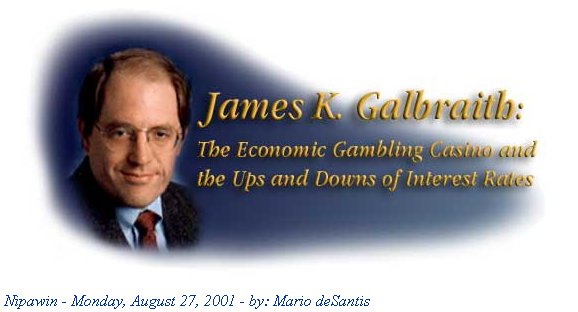Learning Stories
by
Mario deSantis
mariodesantis@hotmail.com
“I am a Canadian, free to speak without fear, free to worship in my own way, free to stand for what I think right, free to oppose what I believe wrong, and free to choose those who shall govern my country.” - -The Rt. Hon. John Diefenbaker, Canadian Bill of Rights, 1960
“The whole judicial system is at issue, it's worth more than one person.”--Serge Kujawa, Saskatchewan Crown Prosecutor, 1991
“The system is not more worth than one person's rights.”--Mario deSantis, 2002
Ensign Stories © Mario deSantis and Ensign
|
|
"The behaviour of a system arise from its structure" -- John D. Sterman Conrad Black has sold the National Post to CanWest and our media has become more concentrated, more uniform, and more powerful to preach the gospel of neoclassical economic directions of changing the central banks' interest rate, less taxes, less government, free market, and welfare for corporations. We have known for a long time that the only constant in our society is change, and the understanding of societal changes has contributed to the definition of different economic theories to assist governments in directing their economies. So, for example, at one time we needed the keynesian theory of governmental over spending to alleviate unemployment, and at another time we needed monetary policies to control our economy so that it wouldn't grow too fast, or because it wouldn't grow at all. What I want to stress is that our society is becoming more complex and what is very important is to learn how to make sense of the world we live in. But our neoclassical economists have stopped learning and they have become obsessed with the continuing fight against inflation. If the economy is growing there is the fear of inflation because of too much money being pumped by the banks for business expansion; therefore the central banks raise their interest rates. If the economy is slowing down, the central banks cut down their interest rates to stimulate growth. So we have the central banks playing up and down with their setting of interest rates, and we have our economists being busy in producing statistics to check if the economy is growing too fast or too little.
Bravo James Galbraith! Full employment without inflation is a key for our societal well being, and the raising or dropping of interest rates is nothing else but an indication of our economic gambling casino. References Related social and economic articles published by Ensign Business Dynamics, by John D. Sterman, 2000, page 107 http://www.mhhe.com/sterman James K. Galbraith, Professor of Public Affairs and Government, Lyndon B. Johnson School of Public Affairs, University of Texas at Austin http://www.utexas.edu/lbj/faculty/galbraith.html 9.5 Theses for the Padinha Door, by James K. Galbraith http://utip.gov.utexas.edu/web/JGarchive/2000/thesesforpadinha.pdf |
